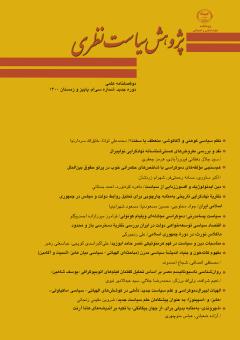الهیات لیبرالدموکراسی و علم سیاست جدید: تأملی در کوششهای الهیاتی- سیاسی «ماکیاولی»، «هابز» و «اسپینوزا» به عنوان پیشگامان علم سیاست جدید
محورهای موضوعی : پژوهش سیاست نظری
1 - استادیار گروه مطالعات سیاسی، بینالمللی و حقوقی، پژوهشگاه علوم انسانی و مطالعات فرهنگی، ایران
کلید واژه: لیبرالدموکراسی, الهیات سیاسی, ماکیاولی, هابز و اسپینوزا.,
چکیده مقاله :
فلسفه مدرن به یک معنای بسیار مهم، خصم فلسفۀ قدمایی بود و برای پیروزی در این نبرد میبایست دایرۀ عمل خود را از حدود «شناخت» امر خوب و امر بد، به سطح وسیعتر «چگونگی رسیدن به» امر خوب و پرهیز از امر بد، بسط میداد. فلسفۀ مدرن و به تبع آن، فلسفۀ سیاسی مدرن لاجرم میبایست زمینه را برای یقینیّاتی جدید فراهم میآورد و این کوشش برای غلبه بر الهیات-سیاسیِ وحیانیِ پیش از او، به عنوان جدیترین چالش بر سر راه تجدّد، امری ضروری محسوب میشد. بدین ترتیب فلسفه سیاسی جدید، وظیفۀ طراحی و تدوین این الهیات جدید را که متضمن موضوعات جدیدی برای یقین انسانها بود، موضوعاتی که قرار بود جای موضوعات قدیمی را در ساحت عقل سلیم بگیرد، بر عهده گرفت. ما در این مقاله برآنیم تا تأملات سه تن از مهم ترین فیلسوفان سیاسی مدرن اولیه را از منظر کوشششان برای تدوین الهیات مورد بحث، از نظر بگذرانیم. به زعم ما هر یک از این سه، وجهی از این الهیات را بسط دادند که در نهایت به پشتوانهای اقناعی برای رژیمهای لیبرالدموکراتیک تبدیل شد. «ماکیاولی» بر ضعیفشدن انسان به واسطه تبعیت از اخلاق مسیحی و تن دردادن به اصل رستگاری نفس به عنوان وهمی که راه را بر رستگاری میهن بسته است، تأکید نمود. «هابز» بر بلایایی مثل جنگ و کشتار و ناامنی از یکسو و واماندن از رفاه و برآوردن امیال طبیعی بدن که رفته رفته قرار بود ذیل مفهوم خوشی، جای سعادت را در معنای قدمایی آن بگیرد، متمرکز شد. و در نهایت «اسپینوزا» در رساله الهیاتی- سیاسی که میتوان از آن با عنوان انجیل لیبرال-دموکراسی سخن گفت، بر ردّ مداخلۀ الهیات وحیانی در امر سیاست و تأکید بر حق طبیعی انسانی به مثابه یک ضرورت طبیعی تأکید نمود.
The question of “what is the good?” was the main characteristic of the Socratic political philosophy. However, the modern political philosophy had to pass this question and like its enemy (namely revealed theology) present a definite and tangible definition of “the good”. In other words, they had to show that philosophy, in addition to being the authoritative source of knowledge, can and must be the basis for promoting human life and a guide for attaining the good in practice. The role of Machiavelli, Hobbes, and Spinoza from this point of view is so prominent. It seems that the good they defended, was the true origin of the values of a liberal democratic regime. These philosophers recognized that the necessity of the dogmatic definition of the good necessitates a theological-rhetorical expression to persuade the addresses. Therefore, without comprehending this theological-rhetorical backbone, the values of a liberal democratic regime cannot be understood completely. The modern political philosophy, on other hand, is the forbear of modern political science that its main subject is behavior and action of the citizens in a liberal democratic regime. Therefore, we can say that modern political science cannot be comprehended completely without contemplating on the ambivalent effort of these philosophers: on the one hand, their theological defense of the liberal democratic values, and on the other hand, their defense of a new scientific politics distinguished radically from ancient political knowledge.
جیرانی، یاشار (1397) «فلسفه و سرزمین پدری»، در: سقراط کسنوفون، ترجمه یاشار جیرانی، تهران، پگاه روزگار نو.
گیلسپی، آلن (1398) ریشههای الهیاتی مدرنیته، ترجمه زانیار ابراهیمی، تهران، پگاه روزگار نو.
منان، پییر (1394) تاریخ فکری لیبرالیسم، ترجمه عبدالوهاب احمدی، تهران، آگه.
وُگان، جفری (1395) تربیت سیاسی در اندیشه هابز، ترجمه حسین بشیریه، تهران، نشرنی.
هابز، توماس (1395) بهیموث یا پارلمان طولانی، ترجمه حسین بشیریه، تهران، نشرنی.
Bacon, Francis (2001) The Essays, Mozam book.
Gildin, Hilail (1973) "Spinoza and Political Problem", in Spinoza: A Collection of Critical Essays, Edited by Marjorie Grene, Anchor Books.
Goethe, J. W. V (2014) Faust I&II, Edited and Translated by Stuart Atkins, Princeton University Press.
Hamilton, Alexander (2003) "The Federalist No. 9", in The Federalist with Letters of "Brutus", Edited by Terence Ball, Cambridge University Press.
Hobbes, Thomas (1839) The English Works of Thomas Hobbes, Vol. 1 and 3, London, J. Bohn.
--------------------- (1987) De Cive, Edited by Howard Warrender, (Clarendon Edition of the Works of Thomas Hobbes) Oxford.
Lessing, G. E (1986) "Lessing's Erns and Falk, Dialogues for Freemasons", A translation with notes by Maschler, Chaninah, Interpretation 14 (1) 1-49.
Machiavelli, Niccolo (1988) ThePrince, Translated by Harvey Mansfield, Chicago University Press.
-------------------------- (1998) Discourses on Livy, Translated by Harvey Mansfield and Nathan Tarcov, The University of Chicago Press.
Pangle, Thomas (1992) "A Critique of Hobbes's Critique of Biblical and Natural Religion in "Leviathan"", in Jewish Political Studies Review, Vol. 4, No. 2, 25-57.
--------------------- (2003) Political Philosophy and God of Abraham, John Hopkins University Press.
Plato (1980) The Symposium and the Phaedo, Translated by Raymond Larson, Harlan Davidson.
Rousseau, Jean-Jacques (2012) Major Political Writings of Jean-Jacques Rousseau, Translated and Edited by John T. Scott, The University of Chicago Press.
Spinoza (2016) The Collected Works of Spinoza Vol. II, Edited and translated by Edwin Curley, Princeton University Press.
Strauss, Leo (1952) The Political Philosophy of Hobbes, Translated by Elsa M. Sinclair, The University of Chicago Press.
--------------- (1958) Thoughts on Machiavelli, Chicago University Press.
--------------- (1962) "An Epilogue", in Essays on the Scientific Study of Politics, Edited by Herbert J. Storing, Holt, Rinehart and Winston.
--------------- (1965) Natural Right and History, Chicago University Press.
--------------- (1982) Spinoza's Critique of Religion, Translated by Elsa M. Sinclair, Schokcen Books, New York.
Tawney, G. A (1918) "Vox Populi, Vox Dei", in Journal of Philosophy, Psychology and Scientific Methods 15 (3) 57-84.
Xenophon (2001) The Education of Cyrus, Translated and annotated by Wayne Ambler, Cornell University Press.
Zuckert, Catherine. H (2017) Machiavelli's Politics, University of Chicago Press.


